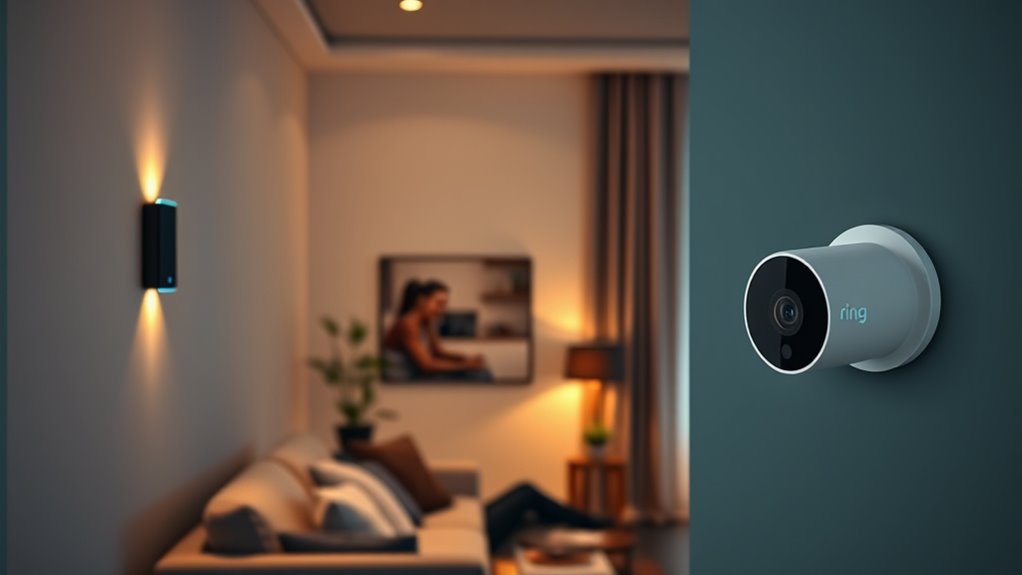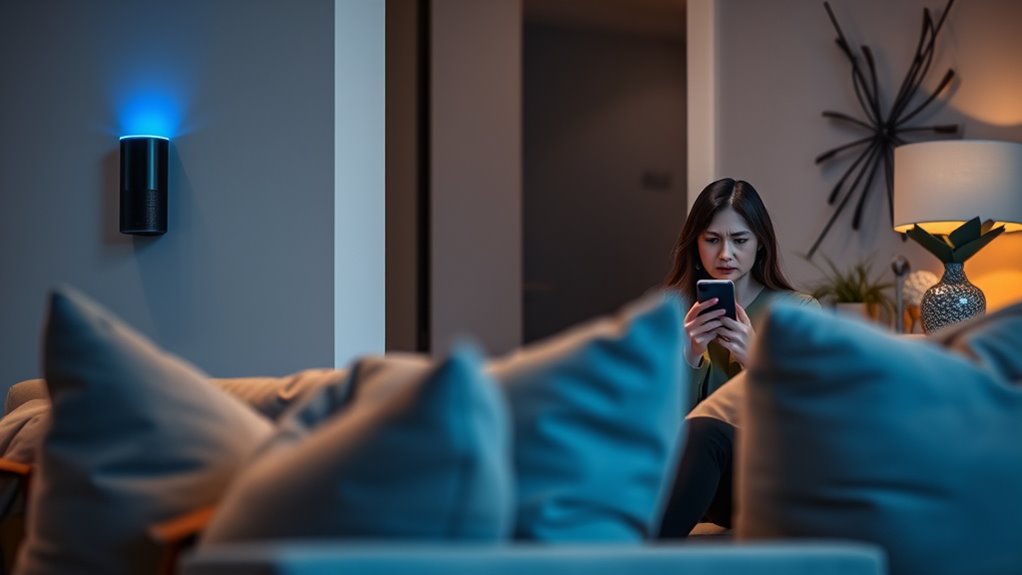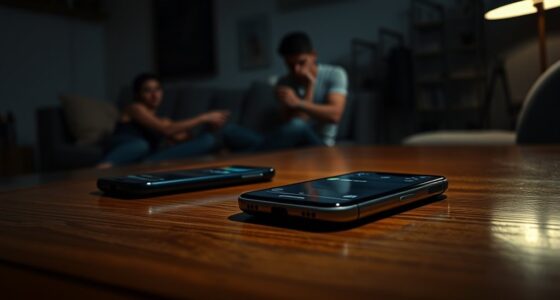Using devices like Alexa or Ring to catch a cheating partner involves serious privacy and legal concerns. These smart home gadgets are not reliable tools for confirming infidelity and can invade privacy or lead to misunderstandings. Secretly monitoring someone can damage trust and may even break laws depending on where you live. If you want to explore more about safe ways to handle suspicions, there’s important information you should consider before taking action.
Key Takeaways
- Alexa and Ring can record audio or video, but their use for secretly catching cheating partners raises privacy and legal concerns.
- Such surveillance may breach trust and ethical boundaries, potentially causing relationship damage.
- Devices may produce false alerts or be hacked, leading to misinterpretations and unreliable evidence.
- Open communication is generally a more ethical and effective approach than covert spying.
- Monitoring with smart devices should comply with legal standards and respect privacy rights.

Smart home technology has revolutionized how we live, offering convenience and security at our fingertips. Devices like Alexa, Ring, and other smart gadgets can monitor, record, and even alert you to unusual activity around your home. But as you consider using these tools to catch a cheating spouse, it’s vital to weigh the privacy concerns and ethical implications involved. While it might seem tempting to install cameras or listen in on conversations, you must recognize that these actions can infringe on privacy rights—not just yours but others as well. Using these devices to monitor someone without their knowledge raises serious questions about consent and trust, which are fundamental in any relationship. You could be crossing a line that leads to more harm than good, damaging relationships or even breaking laws depending on your jurisdiction.
Using smart home devices to catch a cheating spouse raises serious privacy and ethical concerns.
Beyond privacy concerns, you should also consider the ethical implications. Is it right to invade someone’s privacy, even if you suspect infidelity? Relying on smart home technology for such purposes can create a slippery slope, blurring the lines between safeguarding your interests and violating personal boundaries. If you’re secretly listening or recording conversations, you might discover evidence of cheating, but you also risk fostering distrust and resentment. It’s a delicate balance—using these devices might provide proof, but it can also erode the foundation of honesty and respect that relationships depend on. Think carefully about whether surveillance aligns with your values and whether it promotes transparency or secrecy.
Additionally, smart devices are not foolproof. They can generate false alarms, record innocent interactions, or be hacked by malicious actors, leading to misinterpretations or further complications. If your goal is to uncover infidelity, consider whether technology is the right approach or if open communication might be more effective and ethical. Relying solely on gadgets can create a false sense of certainty, and you might end up making decisions based on incomplete or flawed information.
Furthermore, understanding the capabilities and limitations of home security technology can help you make more informed decisions about monitoring.
Ultimately, if you choose to use smart home devices to monitor your partner, do so with caution and awareness of the ethical and legal gray areas involved. Respect for privacy should remain a priority, and it’s often better to address issues directly rather than through covert surveillance. Remember, technology can help protect your home, but it shouldn’t replace honest dialogue or trust-building efforts. Weigh the benefits against potential consequences carefully, and always consider whether your actions are fair, respectful, and legally sound before deploying smart devices for personal investigations.
Frequently Asked Questions
Can Smart Home Devices Detect Emotional Infidelity?
Smart home devices can’t definitively detect emotional infidelity. They can monitor behavioral patterns like unusual activity or emotional cues such as voice tone changes, but these aren’t conclusive proof. You might notice anomalies, but interpreting emotional cues requires context and understanding. While smart devices can provide insights into behavior, they can’t accurately or ethically determine emotional infidelity without risking false assumptions or privacy violations.
Are There Legal Risks in Using Smart Devices for Surveillance?
Using smart devices for surveillance can lead to serious legal implications and privacy violations. You might unknowingly break laws if you record someone without their consent or invade their privacy. Think about the consequences—lawsuits, fines, or criminal charges—if your surveillance crosses legal boundaries. Always research local regulations and respect privacy rights to avoid these risks, ensuring you’re acting within the law when monitoring others.
How Accurate Are Alexa and Ring in Identifying Suspicious Activity?
Alexa and Ring are fairly accurate in identifying suspicious activity through voice recognition and motion detection, but they’re not foolproof. Voice recognition can sometimes misidentify voices, especially in noisy environments, while motion detection may trigger false alarms from pets or moving shadows. You should regularly review footage and alerts to confirm accuracy, as relying solely on these features might lead to missed or false detections.
Can Smart Home Data Be Used as Legal Evidence in Court?
Like a locked vault, smart home data can serve as legal evidence if you meet consent requirements and guarantee proper data encryption. Courts may accept this evidence if you’ve obtained clear permission from all parties involved and have maintained data integrity. You must also verify that the data hasn’t been tampered with. So, yes, your smart home records can hold weight in court when handled responsibly and ethically.
What Privacy Concerns Arise From Using Smart Tech for Spying?
Using smart tech for spying raises serious privacy concerns. You risk exposing your data privacy if unauthorized access occurs, allowing hackers or malicious actors to view sensitive information. These devices may inadvertently record private moments, and if you don’t secure them properly, you could face legal or ethical issues. Always protect your devices with strong passwords and stay aware of their data collection practices to prevent unauthorized access.
Conclusion
So, next time you wonder if your smart devices might reveal more than you bargained for, remember, coincidence often plays a role. Those unanticipated recordings or alerts could be just a glitch—or maybe something more. While tech can seem sneaky, it’s also a reminder that trust and communication matter most. Keep your eyes open, but don’t forget, sometimes, the smallest coincidence can unexpectedly tell a big story.









